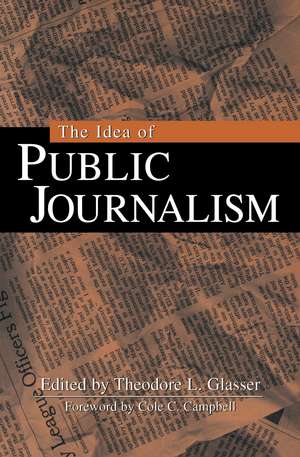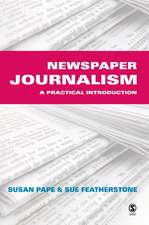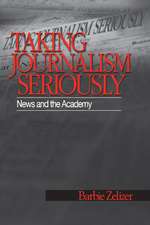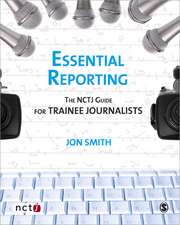The Idea of Public Journalism: The Guilford Communication Series
Editat de Theodore L. Glasseren Limba Engleză Paperback – 18 noi 1999
This volume offers a critical and constructive examination of the claims of public journalism, the controversial movement aimed at getting the press to promote and indeed improve--not merely report on--the quality of public life. From leading contributors, original essays refine the terms of the debate by situating it within a broad cultural, historical, and philosophical framework. Exploring the movement's promise as well as its problems, the book sheds light on vital issues of political power, freedom of expression, democratic participation, and press responsibility.
Preț: 277.02 lei
Nou
Puncte Express: 416
Preț estimativ în valută:
53.01€ • 55.48$ • 44.12£
53.01€ • 55.48$ • 44.12£
Carte tipărită la comandă
Livrare economică 31 martie-14 aprilie
Preluare comenzi: 021 569.72.76
Specificații
ISBN-13: 9781572304604
ISBN-10: 157230460X
Pagini: 229
Ilustrații: black & white illustrations
Dimensiuni: 152 x 229 x 16 mm
Greutate: 0.42 kg
Ediția:New.
Editura: Guilford Publications
Colecția Guilford Press
Seria The Guilford Communication Series
ISBN-10: 157230460X
Pagini: 229
Ilustrații: black & white illustrations
Dimensiuni: 152 x 229 x 16 mm
Greutate: 0.42 kg
Ediția:New.
Editura: Guilford Publications
Colecția Guilford Press
Seria The Guilford Communication Series
Public țintă
General, Professional Practice & Development, and UndergraduateCuprins
THE IDEA OF PUBLIC JOURNALISM
Contents
Foreword: Journalism as a Democratic Art, Cole C. Campbell
Introduction: The Idea of Public Journalism, Theodore L. Glasser
I. The Challenge of Public Journalism
2. The Action of the Idea: Public Journalism in Built Form, Jay Rosen
3. In Defense of Public Journalism, James W. Carey
4. The Common Good as First Principle, Clifford G. Christians
5. Making Readers Into Citizens--The Old Fashioned Way, Thomas C. Leonard
II. The Challenge for Public Journalism
6. Public Journalism and Democratic Theory: Four Challenges, John Durham Peters
7. What Public Journalism Knows about Journalism But Doesn't Know about Public, Michael Schudson
8. Journalism and the Sociology of Public Life, John Pauly
9. Making the Neighborhood Work: The Improbabilities of Public Journalism, Barbie Zelitzer
Appendix A: On Evaluating Public Journalism, Steven H. Chaffee and Michael McDevitt
Appendix B: Reinventing the Press for the Age of Commercial Appeals: A Critical Review of Selected Books and Monographs, Hanno Hardt
Contents
Foreword: Journalism as a Democratic Art, Cole C. Campbell
Introduction: The Idea of Public Journalism, Theodore L. Glasser
I. The Challenge of Public Journalism
2. The Action of the Idea: Public Journalism in Built Form, Jay Rosen
3. In Defense of Public Journalism, James W. Carey
4. The Common Good as First Principle, Clifford G. Christians
5. Making Readers Into Citizens--The Old Fashioned Way, Thomas C. Leonard
II. The Challenge for Public Journalism
6. Public Journalism and Democratic Theory: Four Challenges, John Durham Peters
7. What Public Journalism Knows about Journalism But Doesn't Know about Public, Michael Schudson
8. Journalism and the Sociology of Public Life, John Pauly
9. Making the Neighborhood Work: The Improbabilities of Public Journalism, Barbie Zelitzer
Appendix A: On Evaluating Public Journalism, Steven H. Chaffee and Michael McDevitt
Appendix B: Reinventing the Press for the Age of Commercial Appeals: A Critical Review of Selected Books and Monographs, Hanno Hardt
Notă biografică
Theodore L. Glasser is professor of communication and director of the Graduate Program in Journalism at Stanford University. His work has appeared in a variety of publications, including Critical Studies in Mass Communication, Journal of Communication, Journalism & Mass Communication Quarterly, Nieman Reports, The Quill, and The New York Times Book Review. Custodians of Conscience: Investigative Journalism and Public Virtue, written with James Ettema, was published in 1998 by Columbia University Press.
PREVIOUS GUILFORD BOOK:
His previous publications include Public Opinion and the Communication of Consent, coedited with Charles T. Salmon.
PREVIOUS GUILFORD BOOK:
His previous publications include Public Opinion and the Communication of Consent, coedited with Charles T. Salmon.
Recenzii
Glasser assembles major figures in academia to discuss the strengths and weaknesses of public journalism and to advance the ongoing discussion of the movement. Contributors mix insight and historical background in their superbly written chapters. Anyone interested in public journalism will find much here to contemplate. --Davis Buzz Merritt, Senior Editor, The Wichita Eagle, author of Public Journalism and Public Life
In this book, Glasser draws together voices that cut through the muddy rhetoric that has so marred discussion of public journalism. The authors provide historical perspective and offer diverse lenses through which to view this movement. With wisdom and elegance, they help us engage the truly profound questions that public journalism raises for the future of our democracy. --Frances Moore Lappe, editor-in-chief, The American News Service and co-author, The Quickening of America: Rebuilding our Nation, Remaking our Lives
-In this book, Glasser draws together voices that cut through the muddy rhetoric that has so marred discussion of public journalism. The authors provide historical perspective and offer diverse lenses through which to view this movement. With wisdom and elegance, they help us engage the truly profound questions that public journalism raises for the future of our democracy. --Frances Moore Lappe, editor-in-chief, The American News Service and co-author, The Quickening of America: Rebuilding our Nation, Remaking our Lives
Descriere
Sheds light on issues of political power, freedom of expression, democratic participation and most importantly the responsibility of the press to serve the public.


























